Anyone with even a rudimentary knowledge of Africa’s geo-political genetics recognises the continent’s arrow-straight borders; the surgical scars left by the West’s scramble for imperial control. But the border between Mauritania and Senegal bucks this trend. It’s a physical border, carved by the meandering path of the Senegal River. It’s no wonder, then, that this landscape border brought with it some landscape changes. As we crossed at Diama into the Djoudj National Park, life erupted around us. The sandy swatch of the Sahara gave way to a kaleidoscope of colour. As my senses came back online, I realised I’d completely forgotten what green smelled like. I began to spot road signs, which depicted an array of exotic animals, with all the vigour of a trading card collector. As if on cue, pelicans beat their heavy wings, warthogs bathed in bubbling tributaries and monkeys tumbled across the road ahead. As our little caravan entered the outskirts of St. Louis, Senegal’s old colonial capital, it became clear that the vibrancy of its landscape seeps into all layers of Senegalese life. Shopfronts sported decorative murals, each intricately painted and truly beautiful. And the clothes that replaced the typically drab desert rags worn further north wouldn’t have looked out of place on Jason Donovan.
St. Louis marked the return to solo riding for me. I’d be staying put for a few days’ rest while our group moved on. A group which, since Nouakchott, had expanded. There, I’d reunited with a familiar face. Gui – the Brazilian cyclist I’d met just south of Marrakech – had arrived in the city a day ahead of me and The Pros. In truth, I felt a little bashful at our reunion. We’d shared camp the night we met, just south of Marrakech. Over coffee the following morning I’d laid out my plans for Mission Make Hay, and left Gui engulfed in a cloud of dust as I sped off through the Atlas. Despite moving at quite a clip, I’d taken countless meandering diversions. Gui, on the other hand, had steadily trucked away and beat me to Mauritania’s capital. If I didn’t know better, I’d say there’s material for a fable there.
During my time in Mauritania, I’d struggled to get a feel for any local cuisine. I’m sure Ramadan played its part, but the country felt like culinary Siberia. In fact, that’s probably unfair on Siberia; I’m sure they have a rich food culture by comparison. As a result, we ate biscuits and dates by day, and sardines and couscous by night: staples of the ramshackle village shops that lay scattered along our route. One day, having used the last of our precious salt reserves – the only redeeming ingredient of our sandy semolina – we stopped at one such store to restock. After searching the stacked, sloping shelves, the shopkeeper emerged with something in his hand. Blowing the dust off, he slapped a crude crystalline chunk on the counter. Sel, he announced. The rarity of this staple says it all. Adrien looked quite the kingpin that evening as he crushed the crystal into usable shards with the pommel of his knife, his trademark bushy moustache silhouetted by moonlight. Gui’s experience had been similar, if a little less Breaking Bad.
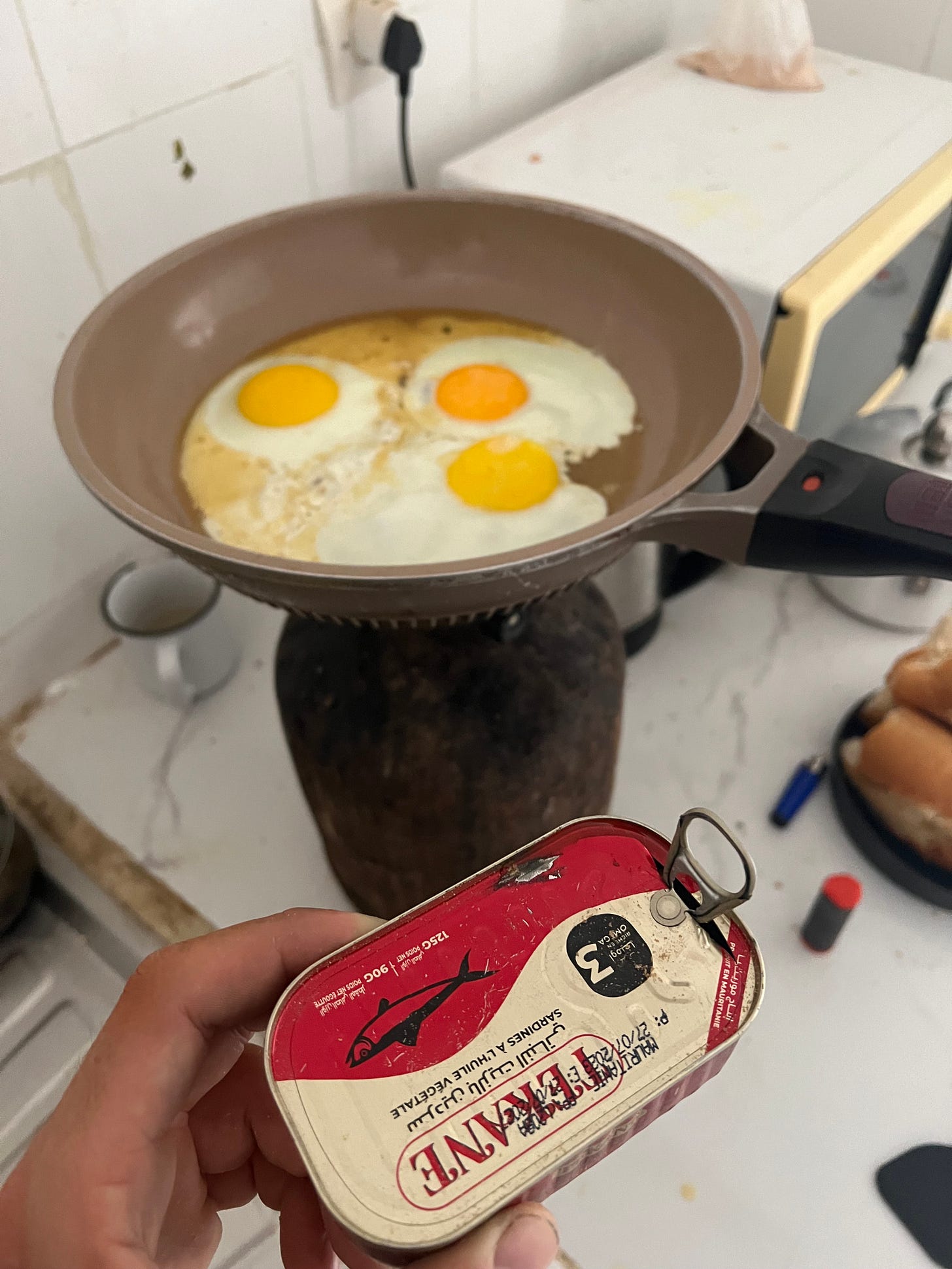
Safe to say, by the time we reached St. Louis, the four of us were craving some variety. Luckily, in St. Louis, I knew good food could be found in spades. Since Tangier, St. Louis was the first city I’d done any research on. During a rest day in Dakhla, idly assessing the route ahead, I’d come across a travel blog called Spirited Pursuit. Lee, the blogger, painted an alluring picture of the city as a cultural and culinary capital of Senegal. Vibrant photographs told the story of a city brimming with local artists and musicians, of sandy shores bustling with intricately painted fishing boats, and of a trove of hidden gastronomic gems. I allowed myself to be caught up in the reverie. Having waved off my fellow travelers, I’d spend my mornings drinking proper coffee – I hadn’t had one of these since Marrakech – and writing. Days would be spent wondering the streets, camera in hand, capturing the beauty around me and soaking in people’s stories. In the evenings, I’d discover local jazz hotspots and feel the raw energy of some underground jams; I half hoped to join Jude Law on stage at one for a joint rendition of Tu Vuo’ Fa L’Americano. Anything was possible.
Things started well. There was proper coffee. And I did spend my mornings writing (or at least trying to). I even met a local artist, Aba, who invited me to his studio to share a crêpe, and to the river the following day to join a boat tour – heavily discounted, of course. And whilst Ramadan had quashed my Jazz plans – music being among the plethora of pleasures that are renounced during the month – I was finally able to chill the slim half bottle of wine I’d illegally smuggled across three Islamic borders. A glass of crisp white and some Sons of Kemet played from my iPhone would have to do. Granted, I was a little surprised when I found myself pouring a chilled red. And more than a little frustrated that I’d hauled this risky cargo so far in search of refrigeration, when it would’ve been far better enjoyed as an anesthetic on the Iron Train.
The next morning, Aba and I rode the choppy waters of the Senegal River on a narrow pirogue; the other tour-ees hadn’t materialised. The captain stood at the stern, milking a tiny outboard for all it was worth while arguing loudly on the phone with his first wife about her discovery of his second. It was a rough enough ride that at moments I hoped he might pay more attention to matters of buoyancy than polygamy. We careered between rather too many larger fishing vessels for my liking. And for Aba’s… at least I could swim. Still, it was a happy morning and we ate a lunch of fresh fish on the beach while Aba thawed his white knuckles in the baking sand.
But that’s where the dream ended. Not long after, my friendly guide asked to borrow some money and then disappeared. It was the work of two days and several trips to the local police station to get it back. As is typical in life, reality took a distinct diversion from expectation. In this case, like the Shot On iPhone campaigns that plaster billboards after every new release, I failed to appreciate the swathes of professional photographers, editors, guides and financiers that prop up the travel blogger’s fantasy. My own Shot In St. Louis campaign was beginning to look a little less vibrant. After the Aba debacle, I struggled to motivate myself to get back on the road. I extended my stay one night, and then another. Rather than wandering the streets feeling the heartbeat of the place, as Lee had had me believe was my St. Louisien destiny, I bounced metronomically between the only open restaurant and the crêperie, half-heartedly tapping away and snapping away between mealtimes. Far from feeling the rhythm in the evenings, I bought overpriced imported snacks from the first supermarket I’d found since Marrakech, and sank into the comfort of familiar TV. I’d wanted to dive into the city; to make friends; to learn. But instead, I’d been treated like a tourist. Easy pickings. A total outsider.
Eventually, I persuaded myself that spending the recovered money on hotel rooms and Pringles was about as pointless as if I’d lost it. It was 5pm by the time I’d packed my bags, and I set off in my Crocs; a surefire indicator no serious riding was on the cards. Pedaling 20km out of town, I almost stumbled at the first hurdle: a signposted hostel, popular with overland travelers, promising a cheap bed and fellow tourists. I even took the turning. But, seeing sense, I backtracked and set out to find camp. Dinner was a sandwich made by one of the many vendors that appear on the streets of Senegalese villages as the sun goes down. I watched as others ordered, then approached and did the same. Not looking up, the woman replied 1000 Francs. Reasonable enough. Then, looking up to see who she was dealing with: 2000 Francs.
By the time I’d pushed Madonna down a sandy backroad, the day was fading fast. The eruption of life had brought with it one of my tougher adversaries: Mosquitos. They descended in droves as soon as dusk settled, meaning pitching a wild camp had become a tightrope walk between being discovered, and devoured. As I raced to build my tent and jump inside, I failed to notice the thorns carpeting the ground around me. Moving would risk becoming a notably cheaper dinner for the hungry mosquitos than the one I’d had, so I resigned to sleeping on my towel for fear of puncturing my precious air mattress. Perhaps the hard ground stiffened my resolve, but I woke in the morning determined to realise my own Senegalese dream; not one I’d found on the internet.
Senegal didn’t make it easy. That day, villages full of children tested my patience. They’d shout and wave. I’d wave back. But almost immediately their hands would turn, palms outstretched, and choruses of Cadeau! Cadeau! (Presents! Presents!) would erupt around me. The bolder among them would take a less tactful approach and simply demand L’Argent! (Money!). When their demands weren’t met – after all, Santa himself doesn’t carry that much cargo – their empty palms would fill with stones and I’d be pelted from the side of the road. Despite not having the common language to express it, the message was clear: I’m a foreign object. If I’m not here to give them something, then what exactly am I here for? It was a good question. Distracted by the shouts and missiles, I missed a crucial turning and, realising too late, resigned myself to the 40km detour. During the detour, the road I was following rudely disappeared. In its place a sandy track wove around the old carriageway. By this point, I’d run out of water and my last drops of patience were quickly drying up. Stopping in a village to search for a well, I was quickly surrounded by another hoard of children and was soon hounded out of town, pushing on to suffer the parching consequences. It was a hard day. But I was learning. Just because it’s a hard day, it doesn’t mean it has to be a bad one.
You see, it was also a day studded with moments of real joy. Moments that, woven together, would create my own Senegalese dream. Among the children, there were those whose pure smiles and shy waves – yet uncontaminated by the imported demands of their older peers – couldn’t help but lift my spirits. And whilst on my unintended detour, I encountered some spectacular wildlife. Cartoonish Hornbills with scarlet beaks prompted waves of childhood nostalgia; Zazu’s Morning Report quickly became an unwelcome earworm. The striking turquoise and cobalt plumage of the Abyssinian Rollers stood out from the landscape’s stock palette of greens and brown; long, delicate tail feathers draped below their prominent perches. And even the loitering vultures sparked a frisson of nervous excitement: their hunched outlines providing an ominous reminder of my fate should disaster strike. All things I might’ve missed had I not taken the scenic route. While the road had been paved, I’d gained immense excitement from pedaling like hell to catch slow-moving HGVs: a little trick learnt during long days in the desert. If I managed to find one moving at Goldilocks pace – not too slow, not too fast, just right – I could tuck in behind it, hanging out in the slipstream to freewheel at 40km/h or more. And even the extreme thirst I’d felt in the evening – painstakingly navigating Madonna through the maze of washboard gravel and sand – had given way to pure euphoria as I finally reached a village shop and cracked a refrigerated tin of pineapple juice. Essentially, there were two sides to the day’s coin. And it was my choice which I’d let it land on.
As I’d entered Senegal, I’d allowed a dream to occupy me; to inhabit my imagined future. Dreams so often live there, in the future. Always a little out of reach, always would-have-been-perfect-if… But what I learnt through the grift, the glamour, the graft and the clamour of my Senegalese reality, is that dreams are realised in the present. So many glimpses of beauty shine through between life’s obstacles. Recognising that beauty allows us to recognise the dream we’re living.





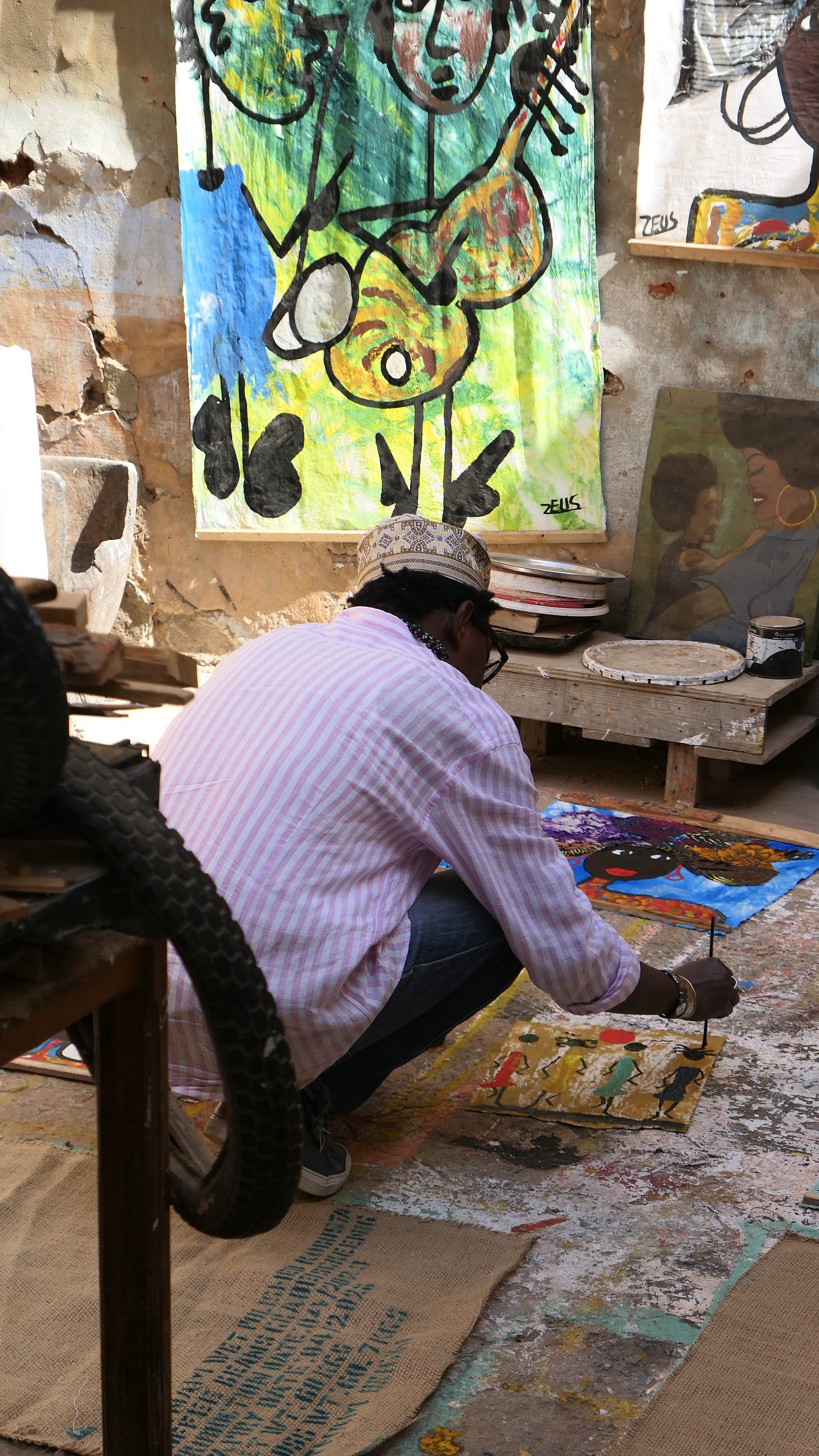
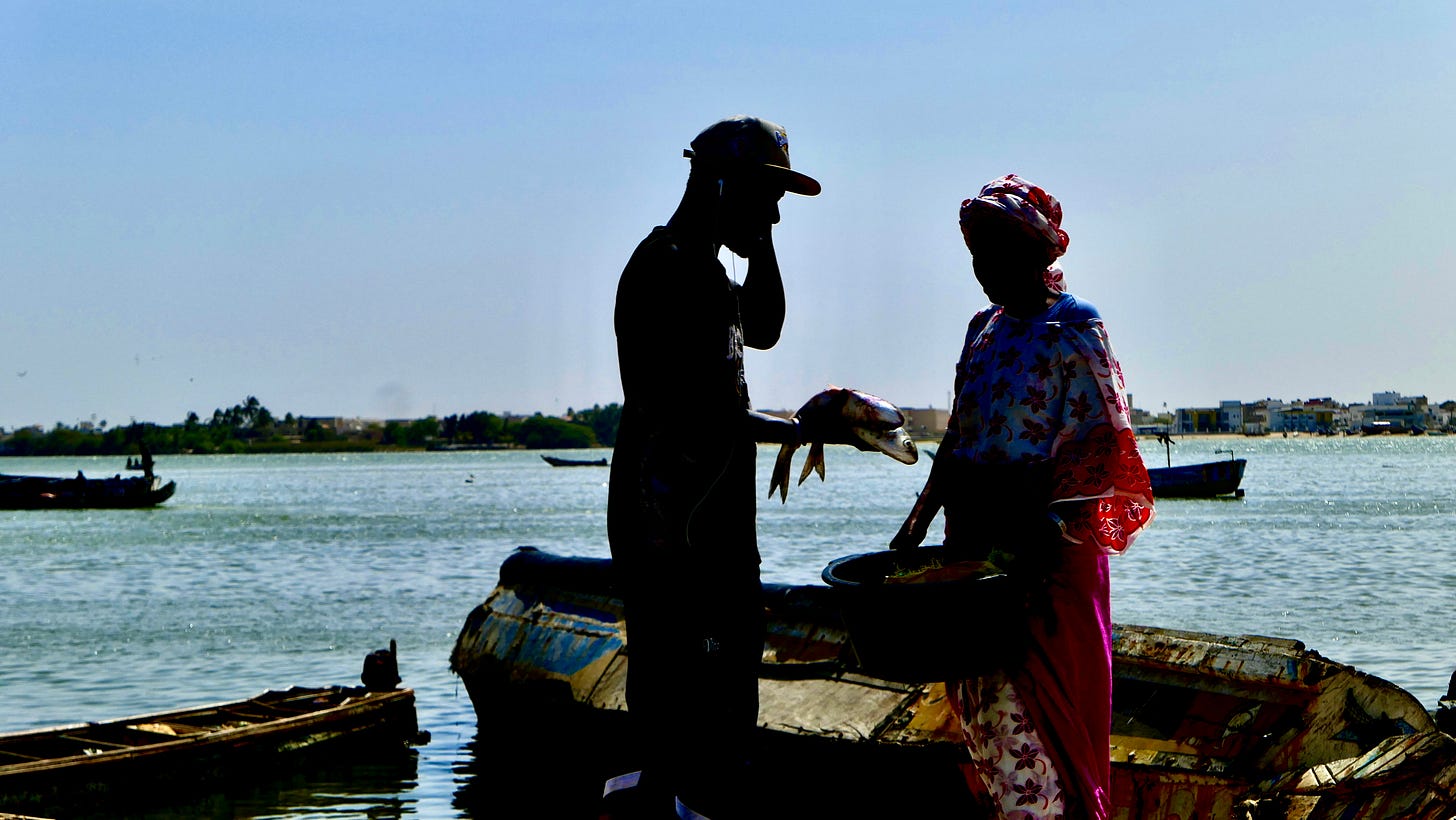
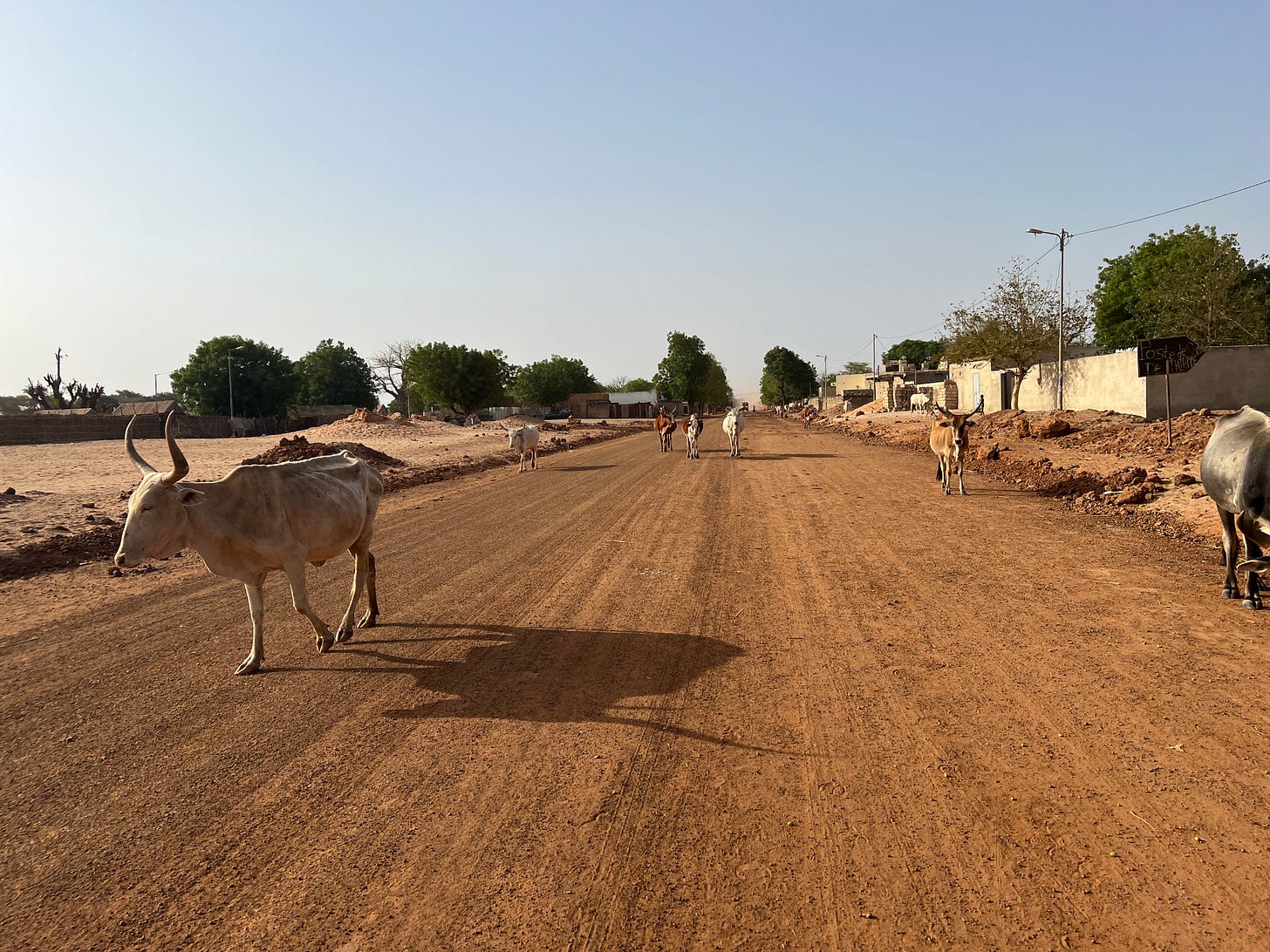
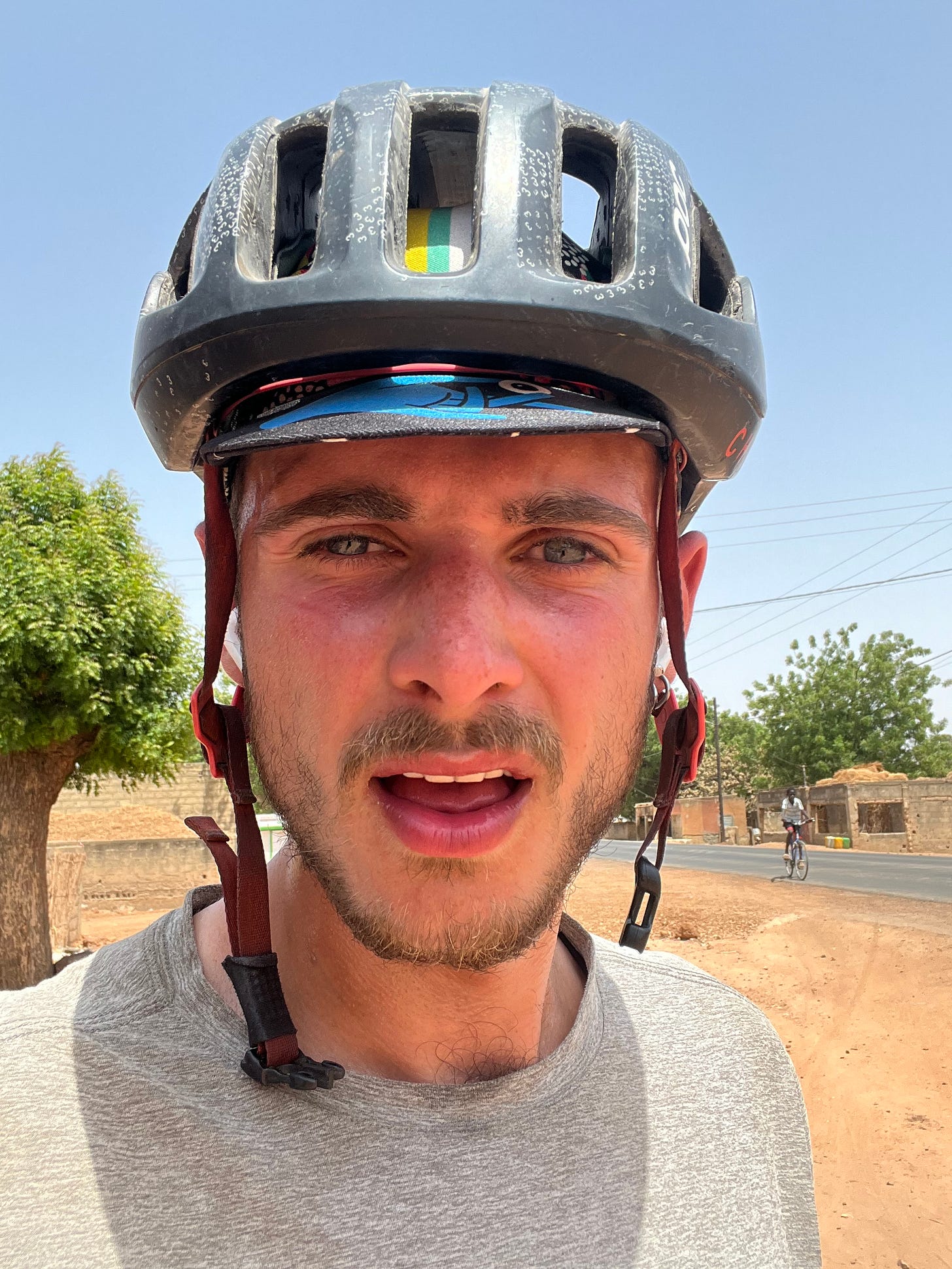
I love that you're seeing the silver linings. We're all thinking of you back here (admittedly whilst enjoying healthily sized gins and tonic). Keep on keeping on!
Love the reference and memories of safe times watching Lion King ..... keep in keeping on Rosie and elt the positives shine through xxx